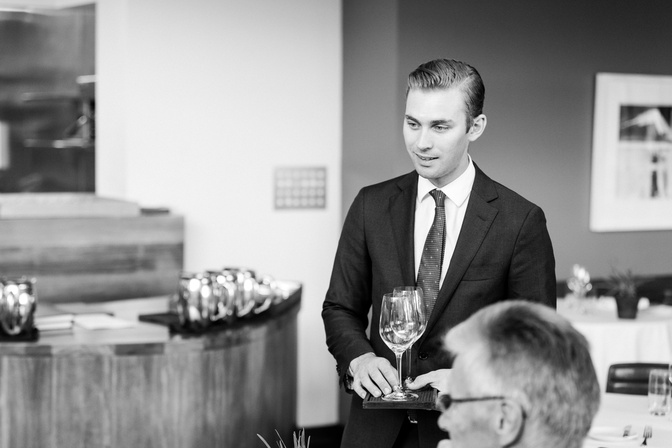A sommelier that hates his profession’s stereotype.

Words by Kelly Pigram
Photography by Brook James
He probably shouldn’t tell us this, but Marcus Radny has been a full-time sommelier since he was 17.
He started at a small wine bar in Perth, then moved onto the Qualia Resort on Hamilton Island, then Vue De Monde and Rockpool. From there he went to Indonesia and Japan where he developed the wine list for major hotel chain Aman. He’s travelled through Japan with a wine-master, and flown to South Africa to taste-test one bottle. Now based at The Royal Mail Hotel in Dunkeld, this 26-year-old is in charge of a wine cellar that stores more than 25,000 bottles.
A sommelier (pronounced som-mill-i-ay) is a wine professional. They usually work in fine dining, and they specialise in all aspects of wine service, particularly wine and food pairing. Radny works closely with the head chef of The Royal Mail Hotel’s award-winning dining room to pair wine to its famous eight-course degustation menu. He owes his career to this skill, and the no-nonsense way he pairs food with wine.
He’s aware of the sommelier stereotype; the wine snob who stands over your dinner table talking about aspects of wine you don’t understand or care about with a pretentious air. He hated the documentary Somm, now famous for a scene in which a group of sommeliers attempting to pass the prestigious Master Sommelier exam (a test with one of the lowest pass rates in the world), describe the flavour of a certain wine as being like, “a freshly opened can of tennis balls”.
“The way they shot the movie and put the whole thing on a pedestal doesn’t help the public perception,” he says. “We’re these nerdy guys in suits who know everything about wine and the guest knows nothing. There was no humility, it was so self indulgent.”
Radny owes his career to not being that guy. He says most sommeliers start out like that because it’s easy to talk (and make things up) about flavour. Flavour is subjective, which means a lot of people will struggle with it.
“If you don’t know what that flavour is like, you’re going to struggle to recognise it,” he explains. “You’re going to go, ‘Oh man, he said it was cherry, but I don’t really taste that. Does that mean I’m no good, or the wine’s no good, or the sommelier is no good?’
“Flavour is a memory. If you haven’t experienced it, or haven’t had any exposure to it, you’re just going to sit there thinking, ‘What the hell is this guy talking about?’”
That’s why when he describes food and wine (and when he pairs the two) he prefers to think about texture instead of flavour. Part of being a good sommelier is helping your guests understand why you’ve paired a certain food with a certain wine. Texture makes it easier for them to understand.
“I always talk about things that are irrefutable,” he says. “Individual qualities and how they work together, like richness against dryness on the palette that most people will be able to recognise, even if they’re not a wine expert.”
“Guests appreciate the relate-ability of a sommelier [who] talks about texture, rather than one who just goes on and on about cherries and tennis balls and stuff.”
Radny also says you won’t make it as a sommelier if you can’t tell a good story. Study hard and learn as much as you like, but standing over a table talking about the German DAC system of categorising sugar levels isn’t going to get you anywhere, because people just don’t care.
“People really engage with the romance of wine,” he says. “If you can spin a wine, know its story and get to know the faces behind the label, you’ll be great.
“It’s not easy. You need to study hard, and work in venues that push you and make you stronger,” he says. “But the rewards come if you work at it. I basically get to see the world for free.”
The Royal Mail Hotel
98 Parker Street, Dunkeld
royalmail.com.au







